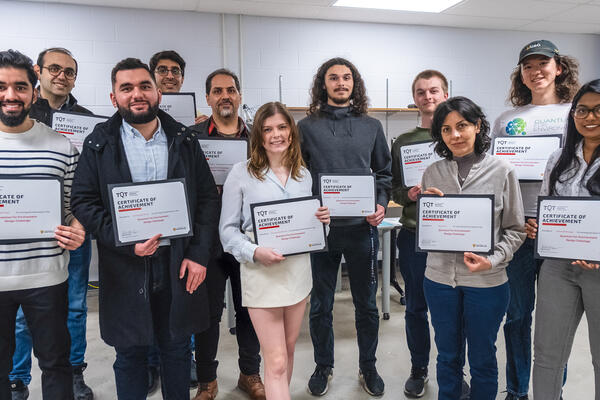
Waterloo Pharmacy professor receives $1.15 million as the newly appointed 2024 Applied Public Health Chair
Dr. William Wong’s research aims to help improve sexually transmitted and blood-borne infections care

Dr. William Wong’s research aims to help improve sexually transmitted and blood-borne infections care
By Milana Madzarac School of PharmacyUniversity of Waterloo School of Pharmacy professor Dr. William Wong will receive $1.15 million in funding over the next five years for his highly focused research to help guide policy and decision-making to ultimately improve HIV/AIDS and Sexually Transmitted and Blood-Borne Infections (STBBI) care.
 In 2006, the Canadian Institutes of Health Research and the Public Health Agency of Canada launched initiatives, including the highly competitive Applied Public Health Chairs Program, to gather strong public health researchers to address the gap in the amount and skills of public health researchers. The funding will allow Wong to develop policy models to rapidly evaluate the value of STBBI interventions, better predict the benefit of interventions and provide needed evidence to guide policy decision-making to improve STBBI care.
In 2006, the Canadian Institutes of Health Research and the Public Health Agency of Canada launched initiatives, including the highly competitive Applied Public Health Chairs Program, to gather strong public health researchers to address the gap in the amount and skills of public health researchers. The funding will allow Wong to develop policy models to rapidly evaluate the value of STBBI interventions, better predict the benefit of interventions and provide needed evidence to guide policy decision-making to improve STBBI care.
“My vision is for the STBBI policy model to be a practical, interactive, evolving policy tool freely available, that enables decision-makers to conduct customized analyses, explore policy alternatives and shape STBBI policy in a timely manner,” says Wong.
Wong’s unique interdisciplinary training in computer science, machine learning, economic evaluation and health services research, brings a novel approach to help solve these great health challenges.
His research will directly help alleviate demanding large-scale public health challenges faced by Canada’s growing population. Currently, hepatitis C virus (HCV), human papillomavirus (HPV), hepatitis B virus (HBV) and human immunodeficiency virus (HIV) are among the top six most burdensome infectious diseases in Canada that are expensive to prevent and treat. The Government of Canada has developed an action plan that calls for steep targets to reduce and eliminate infections by 2030.
“To achieve these targets, the government must consider strategies that include vaccination, screening and treatment, which are expensive for Canada's health care system. The program will provide vital evidence and information for decision makers to help Canada make aggressive, timely, and cost-effective moves to reach these action plan targets,” Wong says. “This will make Canada a global leader in controlling and eliminating these diseases.”
This award will also allow Wong to strengthen his ability to mentor and train the next generation of applied public health researchers to continue addressing future challenges.

Read more
Fifty-six researchers receive Government of Canada funding to solve some of humanity’s most critical problems

Read more
12 Waterloo students and postdoctoral fellows receive up to $10,000 in funding to develop their green-tech solutions

Read more
Waterloo co-op students earn opportunity to contribute to SickKids research
The University of Waterloo acknowledges that much of our work takes place on the traditional territory of the Neutral, Anishinaabeg and Haudenosaunee peoples. Our main campus is situated on the Haldimand Tract, the land granted to the Six Nations that includes six miles on each side of the Grand River. Our active work toward reconciliation takes place across our campuses through research, learning, teaching, and community building, and is co-ordinated within the Office of Indigenous Relations.